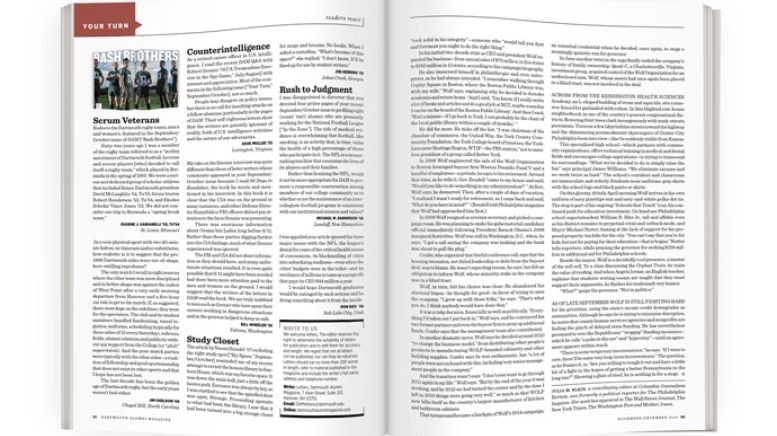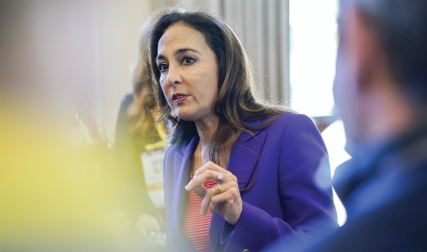Scrum Veterans
Kudos to the Dartmouth rugby teams, men’s and women’s, featured in the September/October issue of DAM [“Bash Brothers”].
Sixty-two years ago I was a member of the rugby team referred to as a “motley assortment of Dartmouth football, lacrosse and soccer players [who] decided to call itself a rugby team,” which played in Bermuda in the spring of 1953. We were a serious and dedicated group of scholar-athletes that included future Dartmouth president David McLaughlin ’54, Tu’55, future trustee Robert Henderson ’53, Tu’54, and Rhodes Scholar Vince Jones ’52. We did not consider our trip to Bermuda a “spring break scam.”
Eugene J. Gabianelli ’53, Tu’54
St. Louis, Missouri
In a very physical sport with two 40-minute halves, no timeouts and no substitutes, how realistic is it to suggest that the pre-1996 Dartmouth sides were out-of-shape, beer-swilling reprobates?
The only match I recall in eight seasons where the other team was more disciplined and in better shape was against the cadets of West Point after a very early morning departure from Hanover and a five-hour car ride to get to the match. If, as suggested, there were kegs on the sidelines, they were for the spectators. The club and its student members handled fundraising, travel logistics, uniforms, scheduling (typically for three sides of 15 every Saturday), referees, fields, alumni relations and publicity without any support from the College (or “adult” supervision). And the post-match parties were typically with the other sides—a tradition of fellowship and good sportsmanship that does not exist in other sports and that I hope has not been lost.
The last decade has been the golden age of Dartmouth rugby, but the early years weren’t bad either.
Jim Sheldon ’69
Chapel Hill, North Carolina
Counterintelligence
As a retired career officer in U.S. intelligence, I read the recent DAM Q&A with Robert Grenier ’76 [“A Tremendous Exercise in the Spy Game,” July/August] with interest and appreciation. Most of the comments in the following issue [“Your Turn,” September/October], not so much.
People may disagree on policy issues, but there is no call for insulting attacks on a fellow alumnus, particularly in the pages of DAM. Their self-righteous letters show that the writers are patently ignorant of reality, both of U.S. intelligence activities and the nature of our adversaries.
Dave Muller ’70
Lexington, Virginia
My take on the Grenier interview was quite different than those of letter writers whose comments appeared in your September/October issue because I read 88 Days to Kandahar, the book he wrote and mentioned in his interview. In this book it is clear that the CIA was on the ground in many instances, and either Defense Director Rumsfeld or FBI officers did not pay attention to the facts Grenier was presenting.
There was enormous information about Osama bin Laden long before 9/11. Rather than those parties digging further into the CIA findings, much of what Grenier experienced was ignored.
The FBI and CIA did not share information as they should have, and many unfortunate situations resulted. It is even quite possible that 9/11 might have been avoided had there been more attention paid to the men and women on the ground. I would suggest that the writers of the letters in DAM read the book. We are truly indebted to men such as Grenier who have spent their careers working in dangerous situations and in the process helped to keep us safe.
Bill Wheeler ’56
Yakima, Washington
Study Closet
The article by Naomi Heindel ’07 on finding the right study spot [“My Space,” September/October] reminded me of my recent attempt to revisit the honors library in Sanborn House, which was my favorite space. It was down the main hall, just a little off the beaten path. Entrance was always by key, so I was startled to see that the spindled door was open. Strange. Proceeding upstairs to what had been the library, I saw that it had been turned into a big storage closet for mops and brooms. No books. When I asked a custodian, “What’s become of this space?” she replied, “I don’t know. It’ll be fixed up for use by student writers.”
Joe Herring ’55
Johns Creek, Georgia
Rush to Judgment
I was disappointed to discover that you devoted four prime pages of your recent September/October issue to profiling eight (count ’em!) alumni who are presently working for the National Football League [“In the Zone”]. The tide of medical evidence is overwhelming that football, like smoking, is an activity that, in time, ruins the health of a high percentage of those who participate in it. The NFL is a money-making machine that consumes the lives of its players and their families.
Rather than lionizing the NFL, would it not be more appropriate for DAM to promote a responsible conversation among members of our college community as to whether or not the maintenance of an inter-collegiate football program is consistent with our institutional mission and values?
Michael M. Ransmeier ’66
Landaff, New Hampshire
I was appalled your article ignored the three major issues with the NFL: the league’s denial for years of the critical health issues of concussions, its blackmailing of cities into subsidizing stadiums—even when the cities’ budgets were in the toilet—and its avoidance of millions in taxes as a nonprofit that pays its CEO $44 million a year.
I would hope Dartmouth graduates would be outraged by such actions and be doing something about it from the inside.
Don Ries ’66
Salt Lake City, Utah
The Firefighters
The man second from the right in your photo of student members of the Hanover Fire Department [“Fire Works,” September/October] is Bill Clark ’35, who came to Dartmouth from Exeter. He was a superb athlete who played football, hockey and baseball. When he returned to Exeter after Dartmouth, he coached all three sports and taught mathematics. He was a fine coach, teacher and mentor and was responsible for pointing a number of us Exonians toward Hanover.
Haviland Smith ’51
Williston, Vermont
Rebel with a Cause
As an honors history major and adjunct professor at Georgia State University, I respectfully take issue with professor Robert Bonner’s contention in your “Campus” section [“Quote/Unquote,” September/October] that “the Confederate flag…doesn’t have a relationship to a country that exists.” Although this may be an accurate statement on the face of it, I would submit that the real picture is not so clear-cut.
Yes, the Southern battle flag does reflect a time gone by and a Confederacy that no longer has any standing as a country and has not for more than 150 years (Lincoln and his Union adherents would have contended that the Rebel cause never did have any legitimacy), but let’s not forget that the flag that is now so universally condemned still belongs in our history books if not on government flag poles. My great-great-grandfather, Capt. Elijah Cherry, surrendered with General Lee at Appomattox in April 1865, and I would like to think his exertions under that flag will never be forgotten.
Phil Curtis ’67
Atlanta
Class Act
The article by Pete Barber ’66 in the July/August issue [“Life Support”] stands out as the most meaningful tribute to the College and its affect on our lives I have ever encountered in DAM. Beyond the rightfully honored accomplishments and career success most of us have enjoyed, the friendships we made and the examples we were given to follow are the most precious aspects of our legacy. Pete says it all and gets it exactly right in two short pages of print.
Bill Jevne ’66, Tu’67
Sequim, Washington
Barber's very personal story about his time in and after Vietnam is the best accounting of and by a Dartmouth Vietnam Vet I have read in DAM. Our relationships with our classmates was and is, as Pete says, “life support.” Thanks to DAM and especially Pete and our Dartmouth mates!
Warren C Cook '67
Ivins, Utah
In Search of Solutions
Regarding your May/June cover story, “Why Does Dartmouth Cost So Much?” yours was the wrong question. The right question would be “What can we do about it?” Only two paragraphs of the five-page article were devoted to answers and the two provided—separating Geisel and putting a freeze on tuition—are ridiculous. One came away with the feeling that if we could just categorize the increased costs and lay the blame somewhere—excess administration and bureaucratic laws, for example—we could begin to solve the problem. Neither this nor “increased transparency” is the correct approach.
A prior cost-cutting program was a step in the right direction, but the problem with all such one-time efforts is that they fade away after a few years and the costs just start accumulating again. The problem cannot be solved top down nor by some easy one-liners by luminaries.
As a consultant at McKinsey for 30 years, I have seen all kinds of institutions deal with cost control. The best, such as Toyota or Danaher, have built it into their DNA, and they get results year in, year out. Such efforts need to start with small, typically 3-month pilots led by experts but over time transferred to the day-to-day owners. All sort of institutions and functions make use of lean techniques, but it takes time, effort, commitment from the top and engagement from the front line. Eighteen months is the minimum time to get a program started, to construct the common language, to train the trainers and to show initial results—often gains of 40 to 50 percent. Once in the blood, it goes on more or less forever. Until we build this type of culture into Dartmouth we will face a losing battle on costs.
W.E. Hoover Jr. ’71
Vedbaek, Denmark
Dartmouth College costs so much due to the federal government’s involvement and its corporate structure [“Why Does Dartmouth Cost So Much?” May/June]. Plato, Aristotle and Hippocrates ran for-profit schools of philosophy and medicine without government meddling.
The not-for-profit is an excellent means to fund political causes, which are never ending. It has no incentive for efficiency or innovation due to the absence of common stock, the potential of which drives the entrepreneur. The not-for-profit tends to be captured by internal management, which is the case for Dartmouth College. Its dominant educational objective appears to be political indoctrination. This mission can be achieved at much less cost.
Charles Courtney ’69
Riverside, Illinois
Photographic Memory
It was a delight to find in the recent DAM the colorized version of a photograph taken during Robert Frost's seminar in 1947 [“Look Again,” May/June]. Sanna Dullaway’s color imagination is impressive. How did she know that the student in the middle was wearing a khaki shirt left over from his army days? Then there is Norm Weissman’s crème caramel jacket—just as I remembered it. But it is inaccurate to say that Frost was lecturing us; He was singing this old English song:
Oh, me father was the keeper of the Eddystone light
And he slept with a mermaid one fine night.
From this union there came three:
A porpoise, a porgy, and the other was me,
Frost praised the ambiguity. Who and what was “me?” Then, referring to the line in the third stanza—“One was exhibited as a talking fish…and the other was served on a chafing dish”—he asked us to note how the “exhibited” slightly disturbs and gives life to the poem's rhythm. He never passed over an opportunity to make fun of academics who apply full-frontal theory to their analysis of poetry.
I like to think that the image and the memory of that moment does indeed belong in Baker Library’s Treasure Room.
Jim Winter ’47
Vancouver, British Columbia




